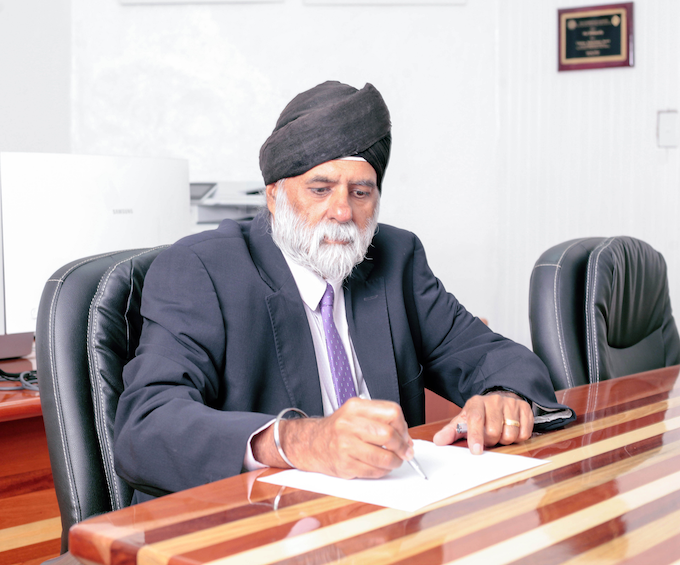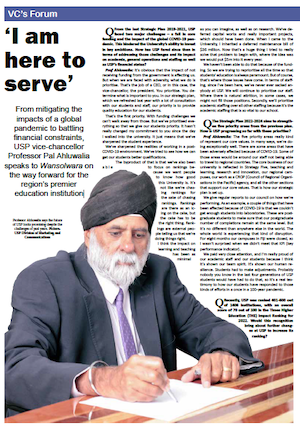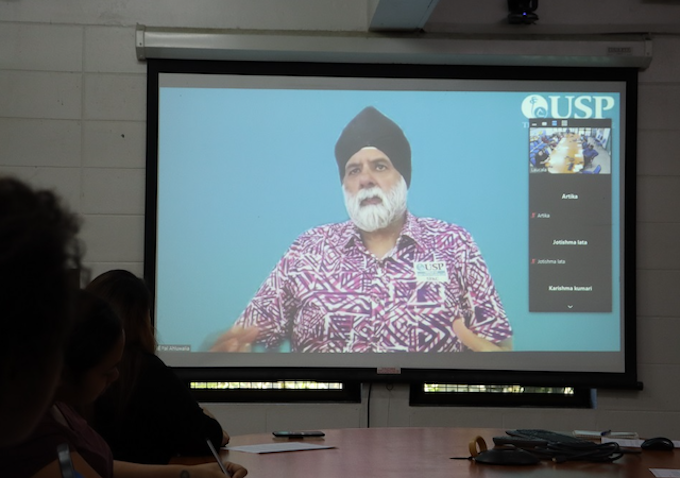
From mitigating the impacts of a global pandemic to battling financial constraints, the University of the South Pacific’s vice-chancellor Professor Pal Ahluwalia speaks to Wansolwara on the way forward for the region’s premier education institution. He has weathered unrelenting pressure from the Fiji government — which has so far refused to pay up the almost F$80 million (NZ$50 million) owed in contributions — but continued to champion the regional mission of the university.
Compiled by Sera Tikotikoivatu-Sefeti, leila Pafrina, Sibete Ietaake and Aralai Vosyaco in Suva
From the last Strategic Plan 2019-2021, USP faced two major challenges — a fall in core funding and the impact of the global covid-19 pandemic. This hindered the university’s ability to invest in key ambitions. How has USP fared since then in terms of addressing those challenges and its impact on academia, general operations and staffing as well as USP’s financial status?
Professor Ahluwalia: It’s obvious that the impact of not receiving funding from the government is affecting us. But when we are faced with adversity, what we do is prioritise. That’s the job of a CEO, or in this case, the vice-chancellor, the president. You prioritise. You determine what is important to you. In our strategic plan, which we refreshed last year with a lot of consultation with our students and staff, our priority is to provide quality education for our students.
That’s the first priority. With funding challenges we can’t walk away from those. But we’ve prioritised everything so that we give our students priority. It hasn’t really changed my commitment to you since the day I walked into the university. It just means that we’ve sharpened the student experience.
We’ve sharpened the realities of working in a post-covid-19 environment. We’ve tried to see how we can get our students better qualifications.
The byproduct of that is that we’ve also been able to focus on rankings because we want people to know how good this university is. It’s not like we’re chasing rankings for the sake of chasing rankings. Rankings are there as an icing on the cake, but the cake has to be the right thing. Rankings are external people telling us that we’re doing things right.
I think the impact on learning and teaching has been as minimal as you can imagine, as well as on research. We’ve deferred capital works and really important projects, which should have been done. When I came to the university, I inherited a deferred maintenance bill of $36 million. Now that’s a huge thing I tried to really solve that problem to begin with, where the idea was we would put $5 million into it every year.
We haven’t been able to do that because of the funding. So we are trying to reprioritise all the time so that students’ education is always paramount. But of course, that’s where those issues have come. In terms of staffing, since I’ve been here, we’ve never ever sacked anybody at USP. We will continue to prioritise our staff. Where there is natural attrition, in some cases, we might not fill those positions. Secondly, we’ll prioritise academic staffing over all other staffing because it’s the academic staffing that is so vital to our school.
The Strategic Plan 2022-2024 aims to strengthen five priority areas from the previous plan. How is USP progressing so far with these priorities?

The five priority areas really kind of represent our core values. In many ways, we’re doing exceptionally well. There are some areas that have been adversely affected because of covid-19. Some of those areas would be around our staff not being able to travel to regional countries. The core business of our university is reflected in Strategy Five, teaching and learning, research and innovation, our regional campuses, our work as a CROP (Council of Regional Organisations in the Pacific) agency, and all the other sections that support our core values. That is how our strategic plan is set up.
We give regular reports to our council on how we’re performing. As an example, a couple of things that have been affected because of covid-19 is that we couldn’t get enough students into laboratories. These are postgraduate students to make sure that our postgraduate number of completions remain at the same level. But it’s no different than anywhere else in the world. The whole world is experiencing that kind of disruption. For eight months our campuses in Fiji were closed, so I wasn’t surprised when we didn’t meet that KPI (key performance indicator).
We paid very close attention, and I’m really proud of our academic staff and our students because I think it’s shown our team spirit. It’s shown our human resilience. Students had to make adjustments. Probably nobody you know in the last four generations of USP students would have had to do that, so it’s a real testimony to how our students have responded to those kinds of efforts in a once in a 100-year pandemic.
Recently, USP was ranked 401-600 out of 1406 institutions, with an overall score of 70 out of 100 in the Times Higher Education (THE) Impact Ranking for 2022. Would this recognition bring about further changes at USP to increase its ranking?
Rankings are not the sole focus of our efforts. Our focus is on our strategic plan and on our mission, vision, and values. Our children must have the opportunity to study at the best university in the Pacific. We are a value-led organisation, so I’m really pleased to say that three rankings in the last 18 months have really given us confidence that we are on the right path.
We have to continue and how do we invest in this? We have funding for research, but we are also continuously making sure that the best academics are recruited and that we don’t compromise on academic quality because, at the end of the day, academic quality is what gives our students that cutting edge. It is the academic quality that helps us produce the research outputs that would then improve the ranking.
In terms of capital projects and ongoing maintenance works, what progress has been made to the upkeep of the university and its campuses?
With the crisis that we’re in right now, we continue to prioritise issues that have to be addressed. If we don’t, the problem just gets worse. So there is the normal routine maintenance and other projects. Some of the other things have been put on the backbench, but we’re still putting a lot of effort into these things. In terms of the Solomon Islands campus, there are no new plans. It’s externally funded. The campus is progressing, and we hope it will be finished next year.
This will be something that is really important because it will provide more opportunities for our Solomon Island students. The Solomon Island students are the second largest number of students of any of our campuses, so the fact that the campus will be finished soon will give a real boost to our Solomons regional campus.

In terms of financial status, is USP implementing new measures to mitigate the fall in core funding? If so, what are these measures? Are we expecting an increase in fees, will there be staff cutbacks or cutbacks to major expenditures, and is USP seeking major external funding as a backup?
By the end of June, the Fijian government would have owed us roughly $74.8 million, which is a very substantial cut in our funding from the agreed formula. What that means is that people try to understand what that funding is for. Funding from different governments is really a subsidy for students studying on campus.
The Fiji government gives that because, one, they have the largest number of students and so the amount is calculated on the number of students and it’s based on a formula which has been in place for many years. That’s the first point I want to make.
The second point I want to make is that we made it work despite the fact that we haven’t been getting that funding.
So that means that Fiji students are still being subsidised, but they need to be subsidised by the overall ways in which the university operates.
So effectively, by not paying their funding, the Fiji government is not really supporting its students, and of course, that affects our core funding, but we have reprioritised students. Our priority is teaching and learning.
Are we going to increase fees? There is no plan to, given the state of our economy at the moment. At the outset, what I’m really proud of is the resilience of our staff as well. We don’t have any staff cuts. We have not taken any. We’re not reducing our staff. We’re actually maintaining ourselves because we believe that the staff we have provide the quality education. Despite everything, we’ve maintained our staff.
We’re always looking for external funding. We’re pursuing that all the time. For us, a lot of external funding is not coming directly into consolidated revenue, which we can use the way we want. We are getting it for projects and projects are being funded. Of course, our biggest challenge remains a non-funded community.
The Kiribati campus lacks essential facilities and equipment to assist students with their programmes. This is a reason many students from Kiribati travel to Fiji to study at the main campus in Laucala. What plans, if any, are in the pipeline to upgrade USP’s teaching and learning facilities on Kiribati and other regional campuses?
One of the things that covid-19 taught us is that we can do a lot of things in more imaginative ways and still deliver quality education. People can study from home. They can do a lot of their own studies. As the vice-chancellor I spent some time in Nauru.
I had an absolutely amazing experience, which made me understand what a small Micronesian country goes through, what challenges people face on a day-to-day basis, and that has really informed a lot of my thinking about where we are.
Now that I’m at one of our larger campuses in Samoa, I’m discovering many things that need to be solved here too. But I think in terms of our programmes, we are offering more and more programmes for our regional students.
The first year experience buddy programme has been successfully running at the Laucala campus, given the importance of non-academic support in a student’s first year of university life. Will the university roll out the First Year Experience buddy programme across other regional campuses?
That’s certainly my expectation that we’ll be doing that. There are two things that we did this year that were very different, something that I am really proud of — the Semester Zero initiative. I had this idea that students should be able to come to university. Many students out there have no experience with technology, which would be normal in other countries.
So that was the first thing that we really wanted to solve, and I think we ran that programme for the first year to get that better. Now there’s a final programme to something that is actually run in different ways on different campuses.
While it is business as usual for some campuses, is USP still concerned about the possible resurgence of other deadly strains of covid-19 and its impact on education? Are appropriate measures being implemented or improved to mitigate these impacts on the USP community?
Absolutely! There’s no room for complacency. I’m really proud of the team and DISMAC — our Disaster Management Committee. We were very quick to develop plans. We’ve had to deal with a lot of different things, and we’ve learnt how to do that effectively. We’re not being complacent. We’ll monitor this.
Every week I get a report on where we are with campuses and what’s going on. I have regular meetings with all my SMTs (senior management teams).
I want to know how our staff are doing, their well-being is important to us. We’re very prepared. I think that’s why we’ve managed this crisis as well as we did. That’s what the ranking was for when we were ranked 11th for “crisis management” by the World Universities with Real Impact (WURI) 2021 global ranking.
You have many notable and remarkable achievements, and these may have been accompanied with its fair share of challenges. How has your time in Samoa been and what are some life lessons or perhaps one factor that has kept you going during those challenging times?
I’ve been very blessed. I’ve had the experience of working at a lot of institutions and I think I’ve been able to bring all that experience together to serve the Pacific. But the one biggest thing in all this, is the support of my staff and my students. Without that, nobody’s worth anything.
I’m eternally grateful and proud of the achievements of our staff and students. This is never a one-person job; it’s always teamwork. It’s always bringing the best of everybody together. I’m so proud of that.
The one thing about rankings is, not only for our students now but also for our alumni, is it shows that we are not just any ordinary university, but that we are the premier institution in the country.
As a custodian of that university, I’m very conscious of that. It’s always been on my mind. I’m not here to rule, I’m here to serve. That’s the attitude which I feel very blessed about and that’s deep in my heart. I know that the minute I stop serving, I’ll be gone.
Moving forward, what can we expect from USP in terms of programme offering, and improvements to learn, teaching and research?
We’re always looking at what the future is going to hold for our region, what is it that our staff and students need to be doing to take us to the new year ahead of everybody else because we’re training the future of the labour force, the workforce that’s going to be required for our region. We’re going to enter into health programmes and we will start looking at other programmes where we can really bring innovation to the region.
Some existing programmes will need to accommodate that change. I think the future looks fantastic, and the new streams of areas that would be available to our students and prospective students also look fantastic.
Wansolwara is the student journalist newspaper of the University of the South Pacific. It collaborates with Asia Pacific Report, which prioritises student journalism.













































